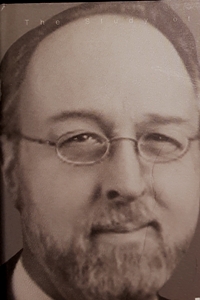Richard Muller (theologian)
This biography of a living person needs additional citations for verification. (November 2010) |

Richard A. Muller (born October 12, 1948, in Flushing, New York) is an American historical theologian.
Life[]
Muller obtained his B.A. in History from Queens College, City University of New York in 1969, his M.Div. from Union Theological Seminary, New York in 1972, and his Ph.D. in Reformation studies from Duke University in 1976. He has taught at Fuller Theological Seminary (1980–1992), has been awarded a Mellon Post-Doctoral Research Grant and has held the Belle van Zuylenleerstoel at Utrecht University (1999). He has served on the editorial boards of Sixteenth Century Journal and Reformation and Renaissance Review. He is P. J. Zondervan Professor of Historical Theology Emeritus and is Senior Fellow of the at Calvin Theological Seminary in Grand Rapids, Michigan.
Work[]
Muller's research and writing has been largely focused on the reassessment of the development of Protestant thought after the Reformation, with emphasis on the nature and character of Protestant orthodoxy and Reformed scholasticism in the seventeenth century. Muller is one of the historians credited with setting aside the "Calvin against the Calvinists" theory of developing Reformed thought.[1][2] His argument is that the attempt to define the entire Reformed tradition in terms of the thought of Calvin is a historical error, inasmuch as Calvin was one of several second generation codifiers of the tradition and inasmuch as the tradition itself was, early on, rather diverse and variegated. The "Calvin against the Calvinists" thesis tended to claim in a rather reductionistic way that Calvin was a "christocentric" theologian in contrast to later Reformed thinkers who had developed a radical predestinarian or deterministic metaphysics. By contrast Muller has argued that the later Reformed thinkers did not develop a predestinarian system but instead understood theology in terms of a series of biblically and traditionally based loci or topics. Their thought does differ in places from Calvin's, but the differences are to be explained on the basis of other sources of the Reformed tradition, such as the thought of Martin Bucer, Heinrich Bullinger, Peter Martyr Vermigli, and others, on the basis of alterations in debate and historical context.[3]
Works[]
- A Dictionary of Latin and Greek Theological Terms (Grand Rapids: Baker, 1985).
- Christ and the Decree: Christology and Predestination in Reformed Theology from Calvin to Perkins (Durham: Labyrinth Press, 1986; Grand Rapids: Baker, 2008).
- The Study of Theology (Grand Rapids: Zondervan, 1991).
- God, Creation, and Providence in the Thought of Jacob Arminius (Grand Rapids: Baker, 1991).
- Church History: An Introduction to Research, Reference Works, and Methods (Grand Rapids: Eerdmans, 1995).
- The Unaccommodated Calvin: Studies in the Formation of a Theological Tradition (New York: Oxford University Press, 2000).
- Post Reformation Reformed Dogmatics: The Rise and Development of Reformed Orthodoxy, ca. 1520 to ca. 1725 4 vols. (Grand Rapids: Baker, 2003).
- After Calvin: Studies in the Development of a Theological Tradition (New York: Oxford University Press, 2003).
- Calvin and the Reformed Tradition (Grand Rapids: Baker Academic, 2012).
- Dictionary of Latin and Greek Theological Terms: Drawn Principally from Protestant Scholastic Theology, 2nd ed. (Grand Rapids, Baker Academic, 2017).
- Divine Will and Human Choice: Freedom, Contingency, and Necessity in Early Modern Reformed Thought (Grand Rapids: Baker Academic, 2017).
- Grace and Freedom: William Perkins and the Early Modern Reformed Understanding of Free Choice and Divine Grace (New York: Oxford University Press, 2020).
References[]
- ^ Klauber 1990, pp. 467–75.
- ^ W. J. van Asselt et al., Inleiding in de Gereformeerde Scholastiek (Zoetermeer: Boekencentrum, 1998): 28, 73–74, 91–92.
- ^ Richard A. Muller, "John Calvin and later Calvinism: the identity of the Reformed Tradition," in The Cambridge Companion to Reformation Theology, ed. by David Bagchi and David C. Steinmetz (Cambridge: Cambridge University Press, 2004): 130–49.
Further reading[]
- van Asselt, Willem J. (2010). Introduction to Reformed Scholasticism. With contributions by T. Theo J. Pleizier, Pieter L. Rouwendal, and Maarten Wisse; translated by Albert Gootjes. Grand Rapids, MI: Reformation Heritage Books. ISBN 978-1-60178-121-5.
- Bagchi, David and David C. Steinmetz, eds., The Cambridge Companion to Reformation Theology. Cambridge: Cambridge University Press, 2004.
- Ballor, Jordan J., David S. Sytsma and Jason Zuidema, eds., Church and School in Early Modern Protestantism: Studies in Honor of Richard A. Muller on the Maturation of a Theological Tradition. Leiden: Brill, 2013.
- Klauber, Martin I (1990), "Continuity and Discontinuity in Post-Reformation Reformed Theology: an evaluation of the Muller Thesis", Journal of the Evangelical Theological Society, 33: 467–75.
External links[]
- Biography at Calvin Theological Seminary
- Staff page at Junius Institute
- 21st-century Calvinist and Reformed theologians
- Reformation historians
- American Calvinist and Reformed theologians
- Queens College, City University of New York alumni
- Duke University alumni
- Union Theological Seminary (New York City) alumni
- 1948 births
- Living people
- Fuller Theological Seminary faculty
- People from Flushing, Queens
- 20th-century Calvinist and Reformed theologians